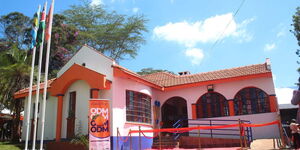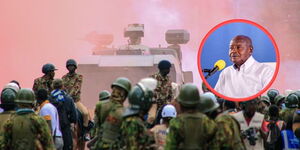Nairobi consists of affluent neighbourhoods that have become go-to spots and preferred residential places for the majority of Kenyans. Have you ever asked yourself how these estates got their names that become part of the city's identity?
Some of them date back to the pre-colonial and colonial times while others are credited to adventurers.
Kenyans.co.ke takes a look at five of these Nairobi estates:
Chiromo
Not many people know about how a Nairobi estate and a University of Nairobi (UoN) campus was given a Malawian name, Chiromo. The name means joining of the streams.
The story revolves around a colonialist cum African adventurer, Ewart Grogan, who resorted to walk from Cape Town to Cairo in order as a show of love to Gertrude Watt, whom he had met in the 1890s.
While on his way, he landed in Nairobi, where he decided to stay for a few nights in order to explore the town further.
He settled on a town where two rivers intersected, reminding him of his trip to a village in southern Malawi called Chiromo where he lost his luggage. He shouted the name Chiromo, reminiscing of his experience- which led to a name that stuck in the minds of the locals.
Donholm
The residential area has become one of the popular residential spot for Kenyans due to its varied amenities and accessibility. However, the estate was initially a dairy farm dubbed Donholm Estate.
During the colonial period, the area was the property of Jeannette Watson who had named it Glasgow's Donholm Estate. So influential was the colonialist that the road adjacent to his farm was named Donholm road.
The area, however, maintained its name after independence though the road was renamed to Jogoo Road. In 1963, the late President Mwai Kibaki was elected Donholm member of parliament.
Kariakor
The estate has gained ground with the majority of Kenyans opting to reside in the area due to its close proximity to the Central Business District (CBD).
The history of the estate dates back to the First World War under British rule. Kenyan soldiers at the time were servants to their British counterparts, doing menial tasks such as luggage carriers.
The soldiers were nicknamed Carrier Corps, a name that stuck with the Kenyans during the entire world war period.
The locals began referring to the area around the British camp 'Kariakor' in reference to the Kenyan soldiers.
Kariakor is also well-known as home of crematoriums where some of Kenya's prominent personalities have been cremated.
Embakasi
Arguably one of the most populated estates in Nairobi, Embakasi serves as host to many factories and tall residential flats.
The name is a Maasai word which is translated to Em-pakasi meaning a river. The estate began as a village in the 1950s and served as host to one of the most notorious prisons during the colonial period known as Embakasi prison, which the locals nicknamed "Satan's Paradise."
At the time, the prisoners were forced to labour and construct Embakasi prison between 1954 and 1958. The airport was later renamed the current Jomo Kenyatta International Airport (JKIA).
Kilimani
The name is derived from Kamba word "Kilima" which means a higher ground or hill hence the names of Kilimambogo and Kilimanjaro.
The story of the now upmarket town dates back to the 1950s when Vasco da Gama pitched camp while on an adventure.
After engaging with the locals, they kept informing him of their day-to-day activity, kuliamani (we are cultivating).
Vasco da Gama however noted down in his book, Quelimane in relation to a port in Mozambique. The version of the name later became solidified as the locals began applying it.
The estate has grown to become one of the posh areas in Nairobi that currently serves as host to eateries, hotels, entertainment joints, and residential houses.
Kilimani is also a hotbed of crime. From hosting wash wash ambassadors to gun-totting criminals, DCI reports frequently headline Kilimani estate.












